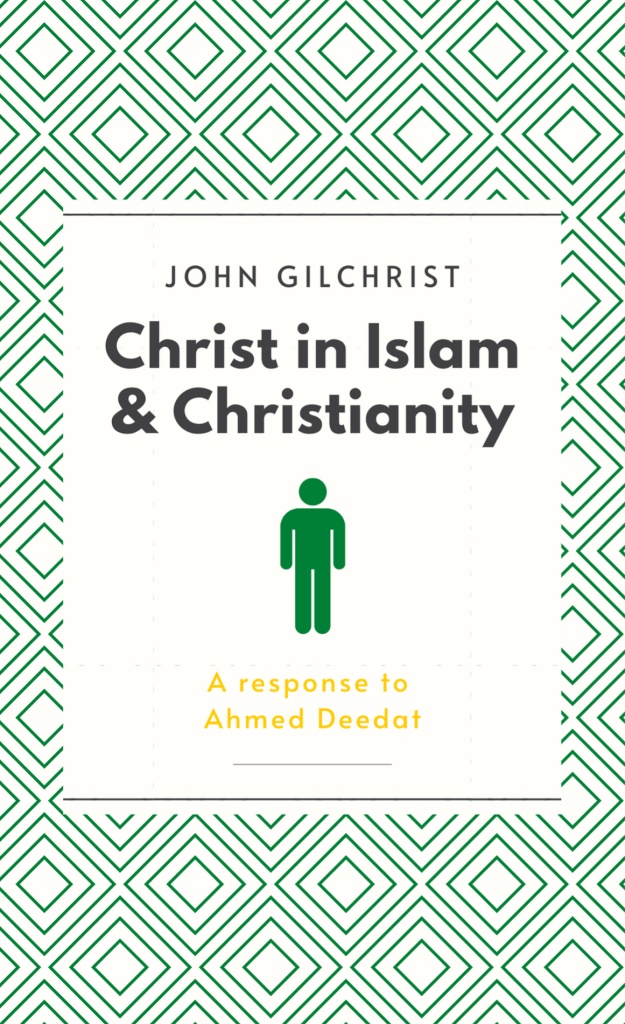A Consideration of the Birth of Jesus
Christ in Islam and Christianity


Chapters
« Ch. 3 - The Exclusive Title given to Jesus
Deedat's prejudices against the Christian Bible find further expression in his treatment of the conception and birth of Jesus. He quotes Luke 1:35 which records the words of the angel Gabriel to Mary to the effect that the Holy Spirit would "come upon" her and that the power of the Most High would "overshadow" her. He comments on these words:
The language used here is distasteful - gutter language - you agree!? (Deedat, Christ in Islam, p. 24)
In his booklet the words "gutter language" are emphasised in bold print. Someone has said, "Beauty is in the eye of the beholder." It seems the converse is equally true. Deedat implies that there is something immoral about the Biblical account of the conception of Jesus. He very significantly omits the rest of the verse: "therefore the child to be born of you will be called holy, the Son of God" (Luke 1:35). The whole verse is set in an awesome context of holiness. Because this child was to be conceived, not by the medium of impure flesh, but by the power of the Holy Spirit, therefore the child would not be impure and sinful like all other men, but would be holy, even the Son of God. How anyone can see anything distasteful in this is beyond understanding. The Qur'an itself teaches that the reason for the conception of Jesus by divine power alone was his unique holiness (Quran 19.19). These words apply:
To the pure all things are pure, but to the corrupt and unbelieving, nothing is pure; their very minds and consciences are corrupted. Titus 1:15
In Luke's Gospel one often reads of their Holy Spirit coming upon people and in every case the expression implies an anointing of his holy influence. Simeon was a man "righteous and devout" and the "Holy Spirit was upon him" (Luke 2:25) and when Jesus was baptised and was praying, the "Holy Spirit descended upon him" (Luke 3:22). Likewise we read that when the glory of God appeared above Jesus when he was transfigured, "a cloud came and overshadowed them" (Luke 9:34). How can anyone say, when similar expressions are used of the conception of Jesus (i.e. that the Holy Spirit "came upon" Mary and that the power of God "overshadowed" her), that this is "distasteful - gutter language"?
It is quite clear that the words used to describe the manner in which the Christ-child would be conceived are generally used in the Bible to describe any occasion where a very real anointing of the power and holiness of God might come upon a person. We really cannot see what the basis of Deedat's argument is and are once again led to the impression that he must be prejudiced against the Christian faith to make such unwarranted charges against it. His efforts to compare the Biblical version of the birth of Jesus unfavourably with the Qur'anic version of the same event prove to be equally futile when he says:
For God to create a Jesus, without a human father, He merely has to will it. If he wants to create a million Jesus' without fathers or mothers, He merely has to will them into existence. (Deedat, Christ in Islam, p. 24)
This begs the obvious question - why did God not create a "million Jesus' without fathers or mothers"? Surely the fact that only one man was conceived in this way shows that it was not the will of God that many should thus be conceived without fathers. On the contrary, it was clearly his express will that only one unique personality was destined to be born in this way. This also demands the probability that there was something very unique about the man Jesus for him to be conceived in this way. All ordinary men have natural fathers and mothers - prophets included. There can be only one reason why Jesus had no human father. Being the Son of the eternal Father it was absolutely essential that he be conceived in human form in an unusual way, without human intervention and by the power of the Spirit of God alone. This is surely quite obvious.
It also does not help Deedat to quote from Yusuf Ali's translation and commentary on the Qur'an in respect of Quran 3.59 where the commentator points to the fact that Adam had neither father nor mother and so has a greater right (as Deedat suggests on page 26 of his booklet) to be called the Son of God. Adam was created in a full adult state when it was not possible he be born of human parents. Someone had be created first. But Jesus was born of a woman alone when God's natural order of procreation had been in effect for centuries. It is obvious why Adam had no father or mother. But what was the reason why God should interrupt the natural order of procreation so that Jesus could be born of a mother only? There is no reasonable alternative to the following explanation given in the Bible which thoroughly contrasts Jesus and Adam:
The first man was from the earth, a man of dust; the second man is from heaven. 1 Corinthians 15:47
Adam was just an ordinary, natural man into whom God breathed the breath of life. Jesus, however, was an eternal personality, a life-giving spirit, who came from heaven and whose conception, therefore, had to involve an interruption of the natural, earthly course of the human race. He was the breath of life and those who believe in him receive eternal life and shall be transformed into his heavenly likeness in the course of time.